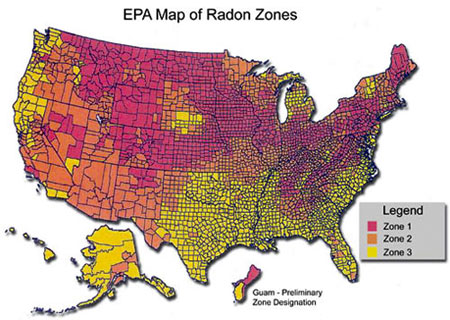Radiation Protection
Is radon really bad for you?
Breathing radon over time increases your risk of lung cancer. Radon is the second leading cause of lung cancer in the United States. Nationally, the EPA estimates that about 21,000 people die each year from radon-related lung cancer. Only smoking causes more lung cancer deaths.

The USA EPA has developed the radon degree of 4.0 picocuries per litre to be the action degree for radon gas in houses. Meaning, take action to reduce radon degrees that are higher than 4 picocuries per litre. Remember that radon threat complies with a direct curve of the amount vs the moment exposed to it plus the added element that each person might be more or less vulnerable to radon relevant cancer.
A lot of health as well as radiation professionals concur that while a little section of granite countertops could produce increased degrees of radon, most countertops give off exceptionally low degrees. According to the US Epa (EPA), it's really unlikely that a granite kitchen counter in a home would certainly boost the radiation level above the normal, all-natural history degree that comes from neighboring soil as well as rocks. Still, individuals concerned regarding radon from countertops and from other family resources can evaluate these degrees utilizing house discovery sets or can hire an expert to do the screening (see the section "How can I stay clear of exposure to radon?"). The words radon examination "fell short" or radon examination "passed" are thrown around out there.
Is radon mitigation really necessary?
When radon gas enters the body, it exposes the lungs to small amounts of radiation. In small quantities, experts say this is harmless. However, in persistent exposures or larger quantities, radon can damage the cells of the lining of the lungs, increasing a person's chance of developing lung cancer.
Radon mitigation systems do a superb job of keeping radon out. Increasingly more house purchasers are seeking residences with radon services in position.

- Your threat of lung cancer increases substantially with exposure https://juliusoypf629.es.tl/What-Is-Radon-Gas-f--Is-It-Hazardous-f-.htm to higher radon levels.
- Radon gas is a naturally-occurring by-product of the radioactive decay of Uranium in the soil.
- Depending on your geographic place, the radon degrees of the air you take a breath beyond your house might be as high as 0.75 pCi/L.
- The nationwide average of outside radon levels is 0.4 pCi/L and it is estimated by the National Academy of Sciences that outdoor radon levels cause approximately 800 of the 21,000 radon induced lung cancer cells fatalities in the United States each year.
- The United States EPA has put it plainly, mentioning, "Any type of radon direct exposure has some danger of creating lung cancer.
If a resident's lasting exposure will certainly balance 4 picocuries per litre (pCi/L) that is 148 Bq/m3, the United States Environmental Protection Company (EPA) suggests homes be dealt with. The United States Cosmetic Surgeon General and the EPA both advise that all houses be evaluated for radon. Several states have energetic radon screening and also reduction programs in position, which call for testing in structures such as public schools. Nevertheless, these are not standard across the country, and the guidelines as well as guidelines on minimizing high radon degrees are also much less typical.
While any level of radon can have an impact, the EPA states readings listed below 2 pCi/L is thought about normal and only lugs a reasonably little raised threat of lung cancer cells. It's commonly tough however possible to lower radon gas direct exposure below these degrees. Radon Act 51 gone by Congress established the natural outside degree of radon gas (0.4 pCi/L) as the target radon level for indoor radon degrees. The United States EPA was charged with establishing functional guidelines and also suggestions for the nation. At or above this degree of radon, the EPA recommends you takecorrective steps to minimize your exposure to radon gas.
How long does it take for radon to cause cancer?
Fact: You will reduce your risk of lung cancer when you reduce radon levels, even if you've lived with an elevated radon level for a long time. Keep in mind that radon levels below 4 pCi/L still pose some risk and that radon levels can be reduced to 2 pCi/L or below in most homes.